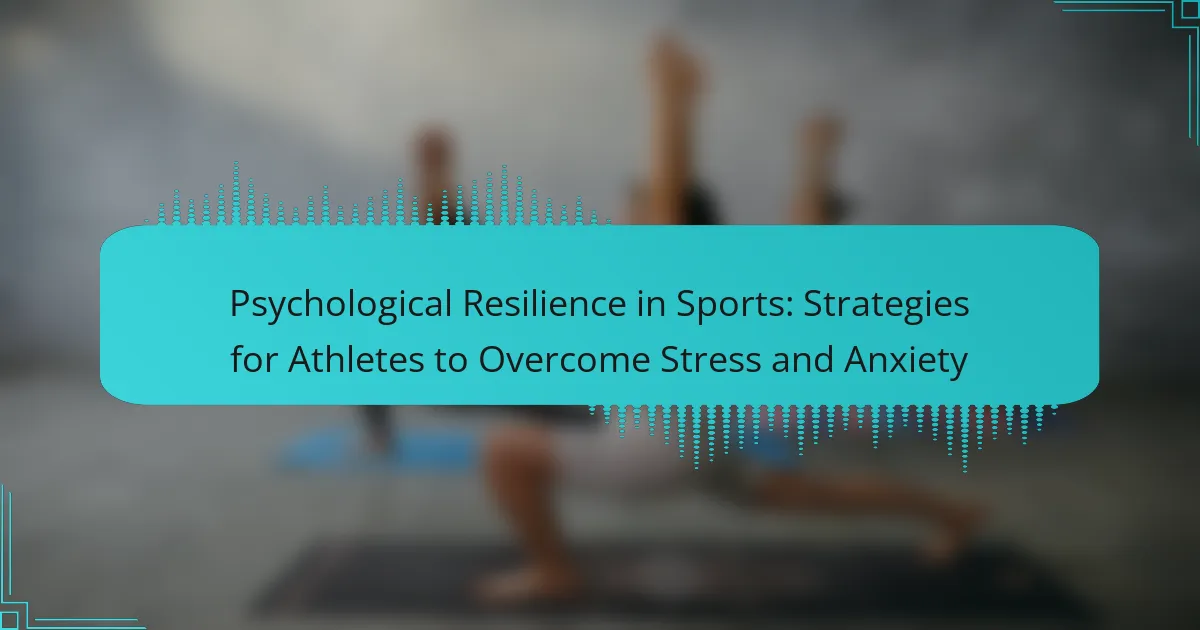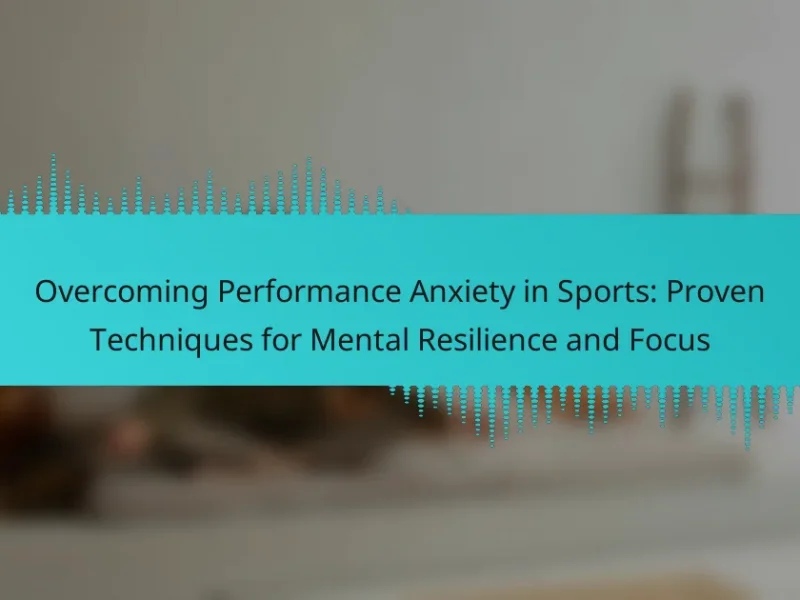Athletes often face significant stress and anxiety that can hinder their performance. Psychological resilience in sports enables athletes to cope effectively with these challenges. This article explores strategies such as mental training, goal setting, and mindfulness practices to enhance resilience. It also addresses common stressors, mistakes in managing anxiety, and the importance of a strong support network for overall well-being.
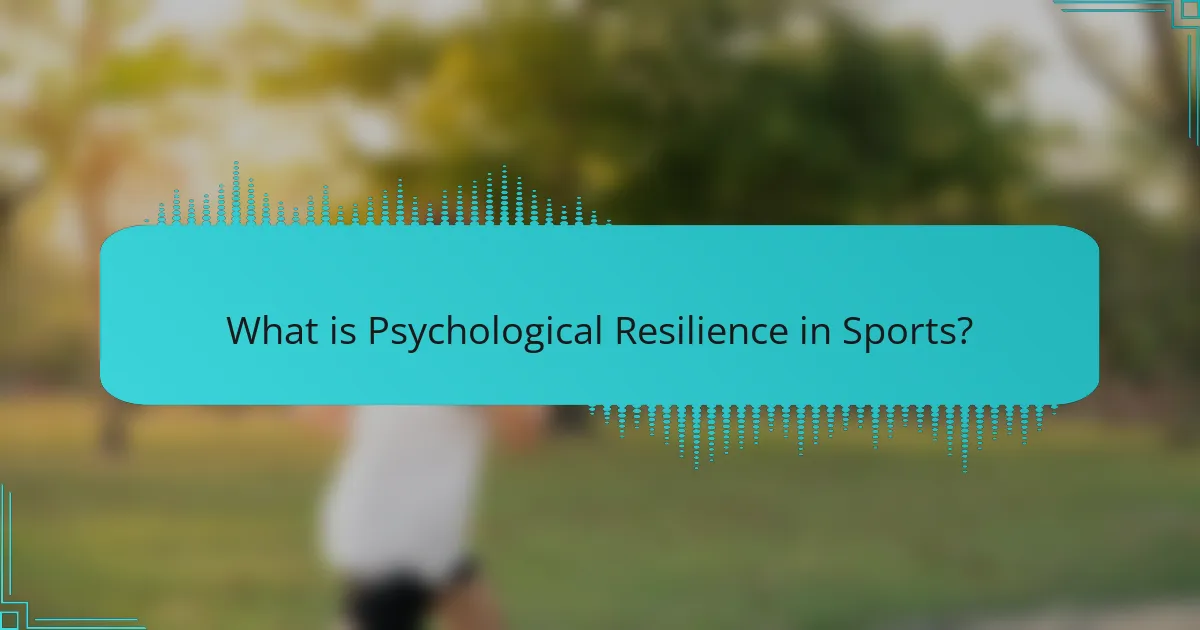
What is Psychological Resilience in Sports?
Psychological resilience in sports refers to an athlete’s ability to effectively cope with stress and adversity. Strategies to enhance this resilience include mental training, goal setting, and mindfulness practices. These techniques help athletes manage anxiety and maintain focus under pressure. Research indicates that athletes with higher resilience demonstrate improved performance during high-stress situations. Incorporating resilience-building practices can lead to long-term benefits in both performance and mental health.
How does resilience impact athletic performance?
Psychological resilience significantly enhances athletic performance by enabling athletes to manage stress and anxiety effectively. Resilient athletes maintain focus, recover quickly from setbacks, and sustain motivation during challenges. Research indicates that resilience can lead to improved performance metrics, such as faster recovery times and better decision-making under pressure. Strategies like mindfulness training and goal-setting are essential for developing resilience, allowing athletes to adapt and thrive in competitive environments.
What are the key components of psychological resilience?
Key components of psychological resilience include emotional regulation, social support, optimism, and problem-solving skills. Athletes can enhance resilience through mental training techniques, such as visualization and mindfulness. These strategies help manage stress and anxiety, enabling better performance under pressure. Resilience is crucial for athletes facing challenges, as it fosters adaptability and perseverance.
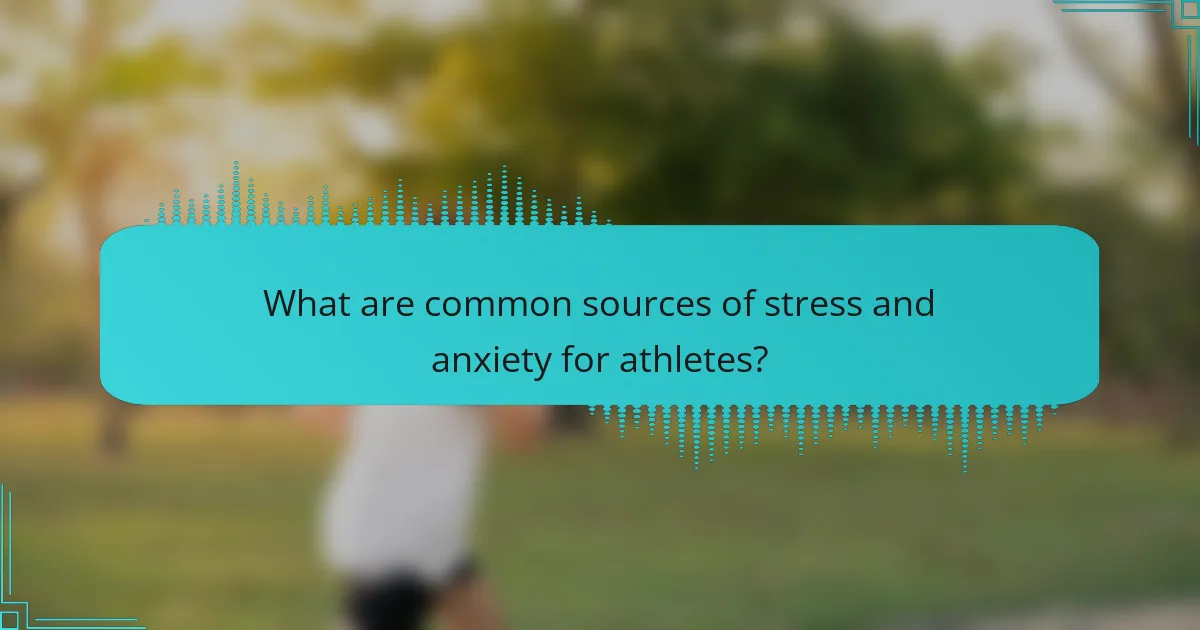
What are common sources of stress and anxiety for athletes?
Common sources of stress and anxiety for athletes include performance pressure, injury concerns, and external expectations. Athletes often face intense competition, which can lead to fear of failure and self-doubt. Additionally, the need to maintain peak physical condition adds to their mental load. Social factors, such as team dynamics and support systems, also significantly impact their psychological resilience.
How do competition pressures contribute to athlete stress?
Competition pressures significantly increase athlete stress by creating high expectations and fear of failure. These pressures can lead to anxiety, impacting performance and mental health. Athletes often feel compelled to meet external standards, which can overwhelm their coping mechanisms. For instance, studies show that over 70% of athletes experience performance anxiety due to competition-related stressors. Developing psychological resilience is essential for athletes to manage these pressures effectively. Techniques such as mindfulness, visualization, and positive self-talk can enhance resilience, enabling athletes to perform under pressure without succumbing to stress.
What role does training intensity play in anxiety levels?
Training intensity significantly influences anxiety levels in athletes. Higher intensity can elevate stress responses, while moderate intensity may enhance psychological resilience. Research indicates that athletes who engage in structured, high-intensity training often experience increased anxiety, particularly before competitions. Conversely, consistent moderate training fosters coping strategies and reduces anxiety by promoting a sense of control and achievement. Balancing intensity is crucial; tailored training plans can optimize performance while managing anxiety effectively.
How can external factors like media affect athlete mental health?
Media can significantly impact athlete mental health by influencing public perception and creating pressure. Athletes often face scrutiny from the media, which can lead to increased stress and anxiety. For example, negative coverage can undermine confidence, while excessive praise may create unrealistic expectations.
Moreover, social media amplifies these effects, as athletes are constantly exposed to public opinions and comparisons. The pressure to maintain a positive image can lead to mental health struggles, including depression and burnout.
To counter these influences, athletes can develop psychological resilience through strategies such as mindfulness, seeking professional support, and establishing healthy boundaries with media engagement. These approaches can help athletes manage external pressures effectively.
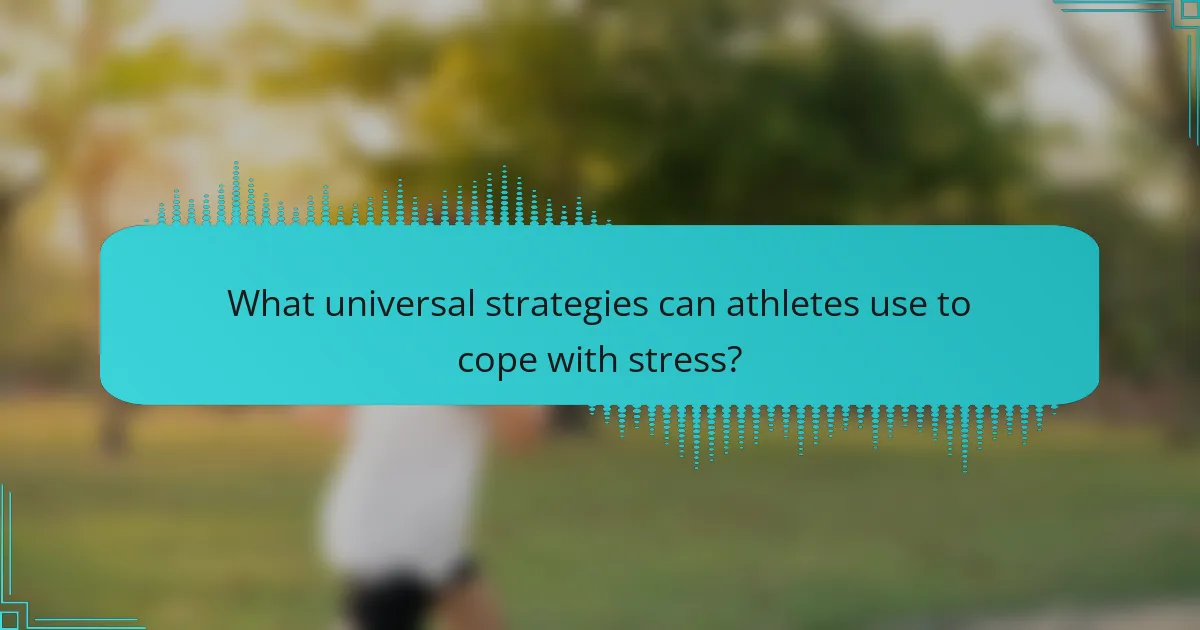
What universal strategies can athletes use to cope with stress?
Athletes can enhance psychological resilience through various universal strategies to cope with stress. These include developing a strong support network, practicing mindfulness techniques, and setting realistic goals.
A strong support network provides emotional stability and encouragement. Engaging with coaches, teammates, and family fosters a sense of belonging. Mindfulness techniques, such as meditation and breathing exercises, help athletes stay present and reduce anxiety. Setting realistic, achievable goals allows athletes to track progress and maintain motivation, minimizing feelings of overwhelm.
Incorporating these strategies consistently can lead to improved performance and overall well-being.
What are effective breathing techniques for stress management?
Effective breathing techniques for stress management include diaphragmatic breathing, box breathing, and 4-7-8 breathing. These methods help athletes enhance psychological resilience by reducing anxiety and promoting relaxation.
Diaphragmatic breathing involves inhaling deeply through the nose, allowing the abdomen to expand, then exhaling slowly through the mouth. This technique increases oxygen flow and calms the nervous system.
Box breathing consists of inhaling for four counts, holding for four, exhaling for four, and holding again for four. This structured approach helps maintain focus and reduces stress.
4-7-8 breathing requires inhaling for four counts, holding for seven, and exhaling for eight. This method can quickly induce relaxation and lower heart rate, making it beneficial during high-pressure situations.
Incorporating these techniques into training routines can significantly improve athletes’ ability to manage stress effectively.
How does physical activity influence mental resilience?
Physical activity significantly enhances mental resilience by reducing stress and anxiety. Regular exercise improves mood, boosts self-esteem, and fosters a sense of control, which are crucial for athletes facing competitive pressures. Engaging in physical activity releases endorphins, promoting a positive mental state and resilience against adversity. Studies show that athletes who maintain consistent training routines exhibit greater psychological endurance, allowing them to better navigate stressors in their sport.
What role does social support play in coping with anxiety?
Social support significantly enhances coping mechanisms for athletes dealing with anxiety. It provides emotional comfort, practical assistance, and a sense of belonging, which are crucial for psychological resilience. Studies indicate that strong social networks can reduce anxiety levels and improve performance under stress. For instance, athletes with supportive teammates often report lower stress and higher self-confidence. Additionally, social support can be a unique attribute that fosters a positive mindset, enabling athletes to navigate challenges more effectively.
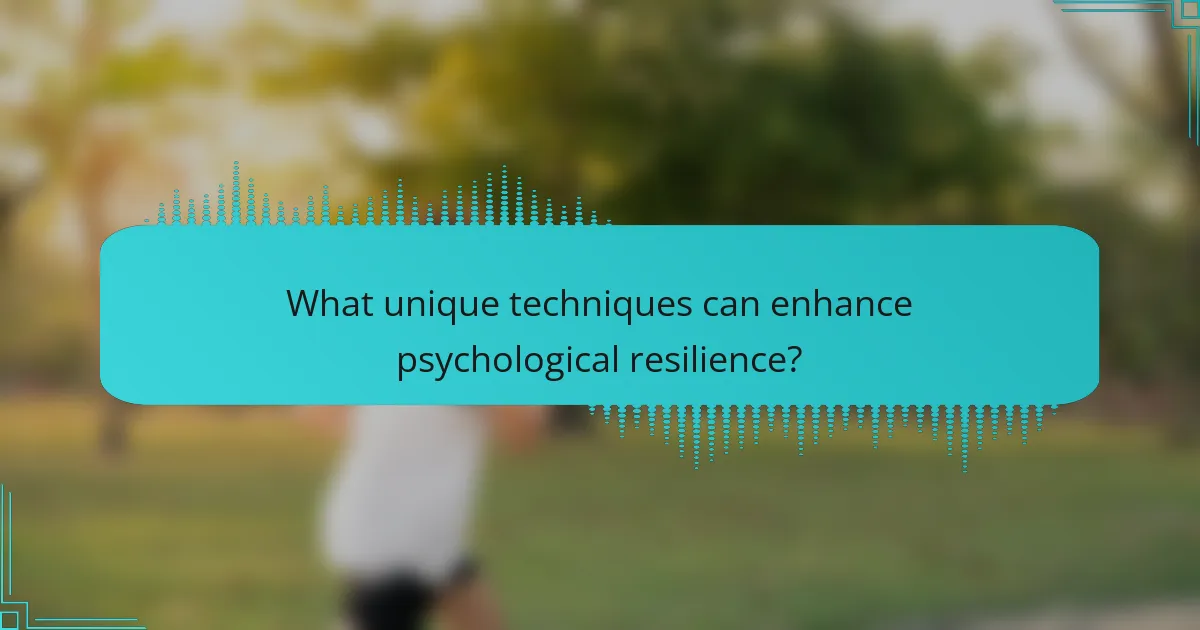
What unique techniques can enhance psychological resilience?
Mindfulness practices enhance psychological resilience by promoting awareness and emotional regulation. Techniques like meditation, deep breathing, and visualization help athletes manage stress and anxiety effectively. Research shows that consistent mindfulness training can improve focus and decrease performance-related anxiety. Additionally, cognitive restructuring enables athletes to reframe negative thoughts, fostering a more positive mindset. Incorporating these techniques into training routines builds mental strength, allowing athletes to overcome challenges and perform under pressure.
How can visualization techniques improve performance under pressure?
Visualization techniques significantly enhance performance under pressure by improving focus, reducing anxiety, and increasing confidence. These mental strategies enable athletes to mentally rehearse successful outcomes, which can translate to better physical performance during high-stress situations. Research indicates that athletes using visualization report lower stress levels and greater resilience, allowing them to perform optimally when it matters most.
What is the impact of goal-setting on athlete mental health?
Goal-setting positively impacts athlete mental health by enhancing focus and motivation. Clear goals foster a sense of purpose, reducing anxiety and stress. Research shows athletes with specific, measurable goals experience greater psychological resilience. This resilience enables them to cope with competitive pressures effectively. Moreover, achieving goals boosts self-esteem and confidence, further supporting mental well-being.

What rare but effective practices can athletes adopt?
Athletes can adopt rare but effective practices like visualization, mindfulness meditation, and biofeedback. Visualization enhances mental rehearsal of performance, improving confidence. Mindfulness meditation reduces stress and increases focus, aiding emotional regulation. Biofeedback provides real-time data on physiological responses, helping athletes control anxiety.
How can journaling contribute to stress relief for athletes?
Journaling significantly contributes to stress relief for athletes by providing a structured outlet for emotions. It enhances psychological resilience through self-reflection, allowing athletes to process experiences and reduce anxiety. Regular journaling can clarify thoughts, identify stressors, and track progress, fostering a sense of control. Research indicates that expressive writing can lower cortisol levels, a key stress hormone, promoting overall mental well-being.
What are the benefits of engaging in creative outlets?
Engaging in creative outlets enhances psychological resilience by reducing stress and anxiety. Activities like painting, writing, or music foster emotional expression and provide a mental escape. Studies show that creativity can improve mood and increase coping skills. Athletes who engage in creative pursuits often experience better focus and reduced performance anxiety, contributing to overall well-being.
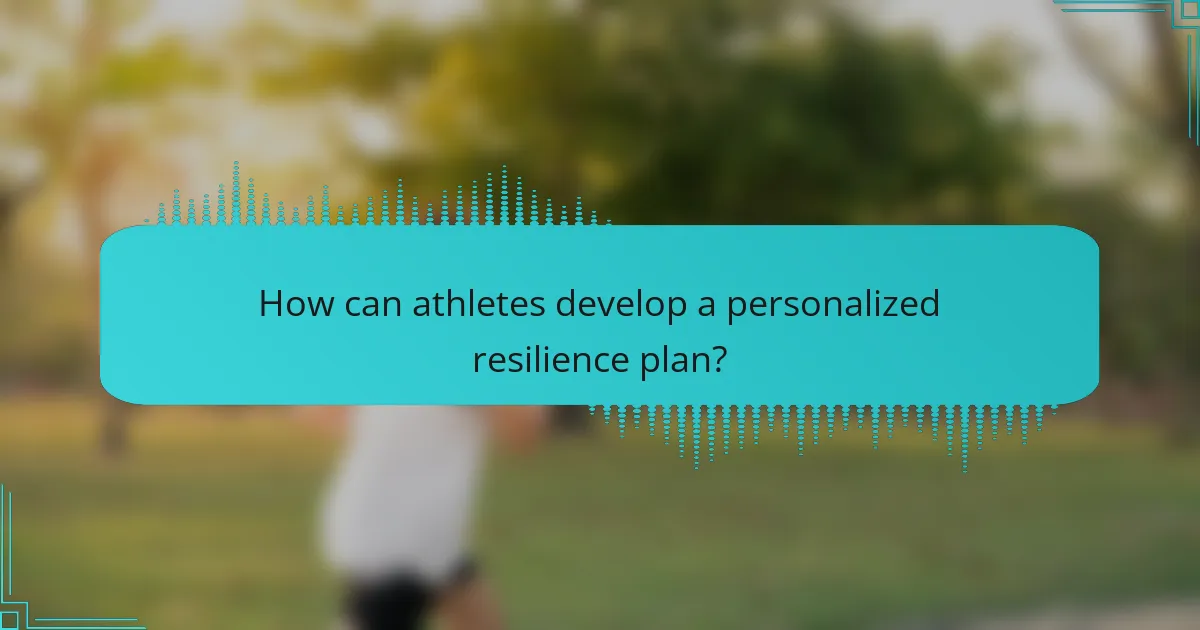
How can athletes develop a personalized resilience plan?
Athletes can develop a personalized resilience plan by identifying stressors, setting specific goals, and incorporating coping strategies. Begin with self-assessment to recognize personal triggers and responses to stress. Next, establish clear, achievable objectives that focus on mental toughness and emotional regulation. Include techniques such as mindfulness, visualization, and positive self-talk to enhance coping mechanisms. Regularly review and adjust the plan based on performance and emotional feedback to ensure its effectiveness.
What steps should athletes take to assess their mental health?
Athletes should take proactive steps to assess their mental health, focusing on self-reflection and professional support. First, they should regularly evaluate their stress levels and emotional well-being through journaling or mental health apps. Second, seeking feedback from coaches or teammates can provide valuable insights. Third, consulting with a sports psychologist can help identify underlying issues and develop coping strategies. Finally, participating in mindfulness or relaxation techniques can enhance psychological resilience.
How can athletes create a support network?
Athletes can create a support network by connecting with coaches, teammates, and mental health professionals. These relationships foster psychological resilience, enabling athletes to manage stress and anxiety effectively. Engaging in group activities or team-building exercises enhances trust and communication. Regularly sharing experiences and challenges strengthens these bonds, providing emotional support and practical advice. Establishing a diverse network ensures access to various perspectives and coping strategies.
What resources can athletes utilize for mental health support?
Athletes can utilize various resources for mental health support, including professional counseling, support groups, and mental health apps. Professional counseling offers personalized strategies for stress management. Support groups provide community and shared experiences, fostering resilience. Mental health apps deliver resources and coping techniques conveniently. Additionally, sports organizations often provide access to mental health professionals. Regular mental health workshops can enhance awareness and coping skills.
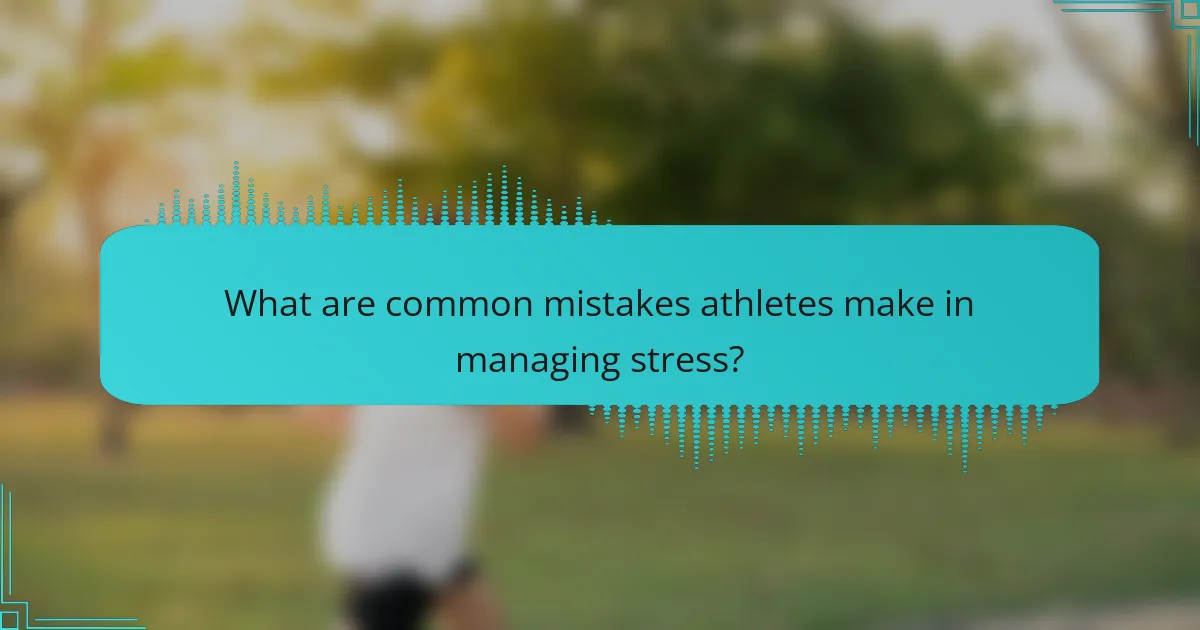
What are common mistakes athletes make in managing stress?
Athletes often make several common mistakes in managing stress, which can hinder their performance. One significant error is neglecting mental health, leading to increased anxiety and burnout. Additionally, many athletes fail to establish effective coping strategies, relying solely on physical training. Another mistake is poor time management, which creates unnecessary pressure. Lastly, ignoring the importance of rest and recovery can exacerbate stress levels.
How does neglecting mental health affect performance?
Neglecting mental health significantly undermines athletic performance. Athletes may experience increased stress and anxiety, leading to decreased focus and motivation. This decline in psychological resilience can result in poor decision-making, reduced physical performance, and increased risk of injury. Addressing mental health fosters better coping strategies, enhancing overall performance and well-being.
What are the pitfalls of overtraining and burnout?
Overtraining and burnout can severely impact an athlete’s psychological resilience. Common pitfalls include decreased performance, increased anxiety, and emotional exhaustion. These effects stem from excessive training without adequate recovery, leading to a negative cycle of stress and fatigue. Athletes may experience diminished motivation and a sense of isolation, further exacerbating mental health issues. Recognizing these symptoms early is crucial for implementing effective strategies to restore balance and resilience.
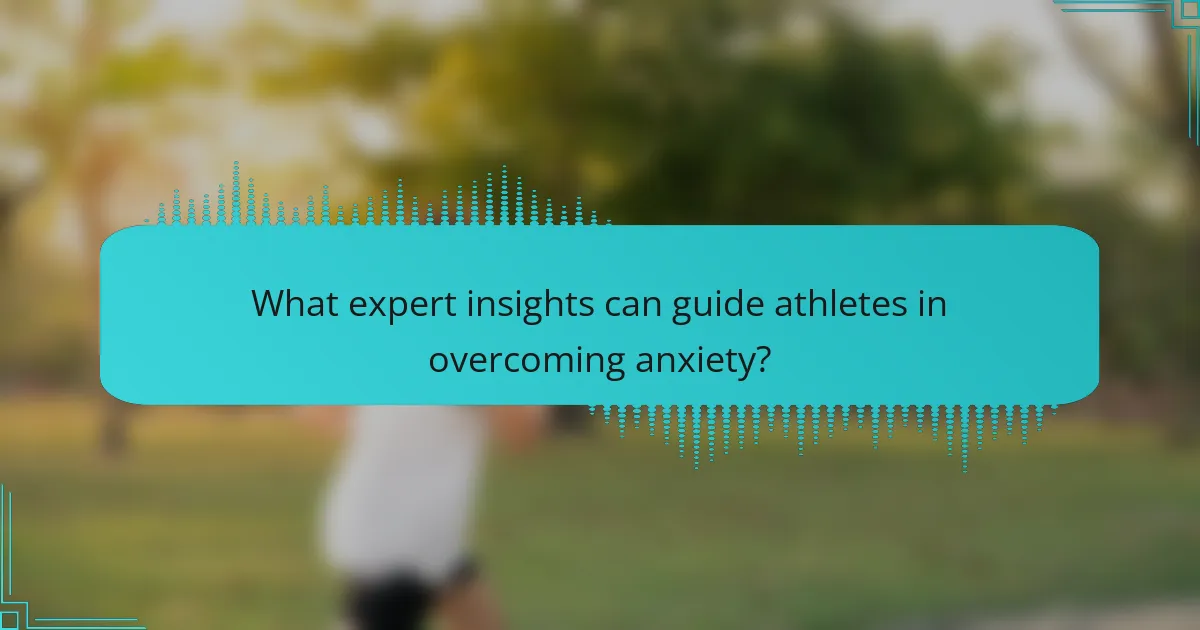
What expert insights can guide athletes in overcoming anxiety?
Athletes can overcome anxiety by implementing psychological resilience strategies. Techniques such as mindfulness, visualization, and cognitive restructuring help manage stress effectively. Research indicates that athletes who practice these methods report lower anxiety levels and improved performance. Additionally, seeking support from coaches and mental health professionals enhances coping mechanisms and fosters a positive mindset.
What advice do sports psychologists offer for stress management?
Sports psychologists recommend techniques such as mindfulness, cognitive restructuring, and goal-setting for effective stress management. Mindfulness helps athletes stay present and reduce anxiety. Cognitive restructuring aids in reframing negative thoughts into positive ones. Goal-setting provides clear direction and motivation, enhancing psychological resilience. These strategies collectively empower athletes to navigate stress and improve performance under pressure.
How can athletes maintain motivation during tough times?
Athletes can maintain motivation during tough times by developing psychological resilience through specific strategies. These include setting realistic goals, focusing on the process rather than outcomes, and cultivating a positive mindset.
Practicing mindfulness techniques helps athletes manage stress and anxiety effectively. For example, visualization and breathing exercises can enhance mental clarity and emotional control.
Additionally, seeking social support from coaches, teammates, and mentors fosters a sense of belonging and encouragement. This network can provide valuable perspectives and reinforce commitment to training and performance.
Finally, reflecting on past successes and learning from failures allows athletes to build confidence and resilience. Emphasizing growth and adaptability strengthens their ability to navigate challenges.
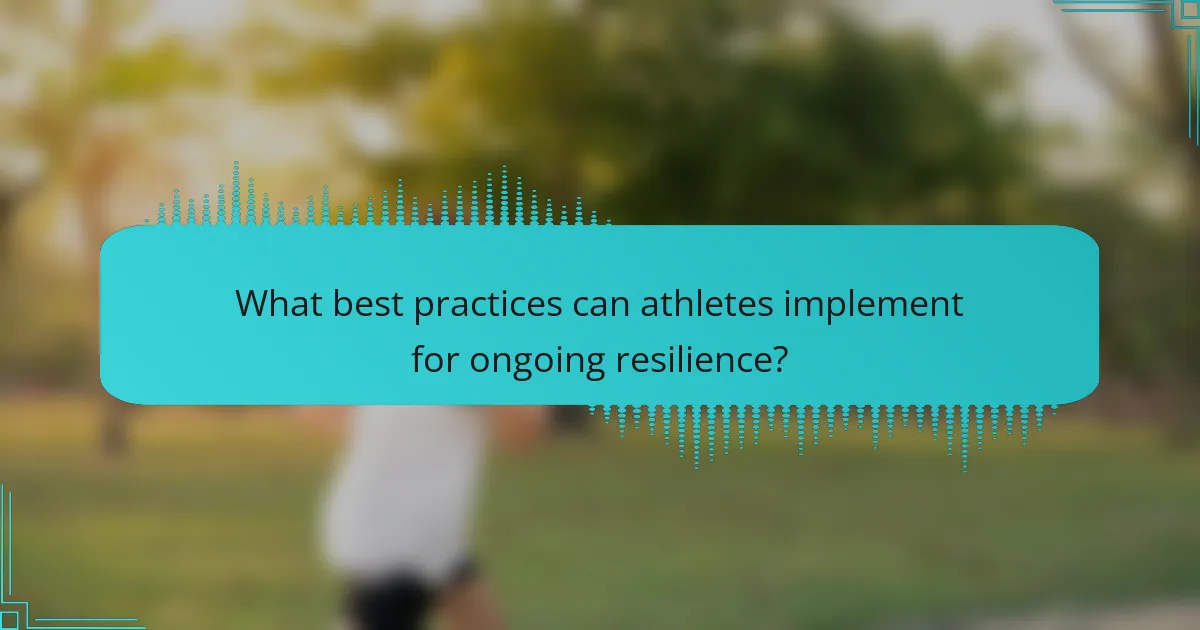
What best practices can athletes implement for ongoing resilience?
Athletes can enhance resilience by adopting mental strategies, focusing on self-care, and building supportive networks. Regular mindfulness practices, such as meditation, improve focus and reduce anxiety. Setting realistic goals fosters a sense of achievement, while visualization techniques prepare athletes for challenges. Engaging in physical activities outside of sports promotes overall well-being. Establishing strong connections with coaches and peers provides emotional support, essential for navigating stress. Regularly reflecting on experiences helps athletes learn from setbacks, reinforcing their resilience over time.
How can regular mental health check-ins improve resilience?
Regular mental health check-ins significantly enhance resilience by providing athletes with tools to manage stress and anxiety effectively. These check-ins foster self-awareness, enabling athletes to identify emotional triggers and develop coping strategies. Research indicates that consistent mental health support leads to improved performance and reduced burnout among athletes. Additionally, regular assessments can help in recognizing early signs of mental health issues, allowing for timely interventions. This proactive approach cultivates a stronger mental framework, empowering athletes to navigate challenges with greater confidence and adaptability.
What techniques can athletes use for continuous self-improvement?
Athletes can enhance psychological resilience through techniques such as mindfulness, goal-setting, and visualization. Mindfulness reduces stress by promoting present-moment awareness. Goal-setting provides clear objectives, fostering motivation and focus. Visualization helps athletes mentally rehearse performances, improving confidence and reducing anxiety.
How can athletes balance competition and personal well-being?
Athletes can balance competition and personal well-being by prioritising mental health strategies. Techniques such as mindfulness, time management, and social support enhance psychological resilience. Mindfulness practices reduce stress and anxiety, enabling athletes to focus better on performance. Time management helps in creating a structured routine, allowing time for training and relaxation. Social support from coaches, teammates, and family fosters a positive environment, promoting emotional well-being. These strategies empower athletes to maintain their competitive edge while ensuring their mental health remains a priority.
